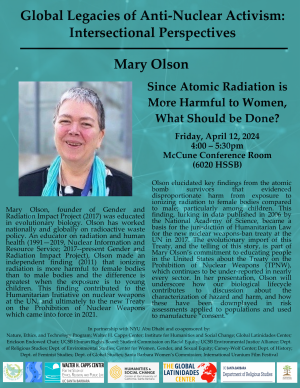Event Date:
Event Location:
- McCune Conference Room (HSSB 6020)
Event Price:
Free
Related Link:
In this lecture, Mary Olson discusses key findings from atomic bomb survivors who evidenced disproportionate harm from exposure to ionizing radiation to female bodies compared to male, particularly among children. This finding, lurking in data published in 2006 by the National Academy of Science, became a basis for the jurisdiction of Humanitarian Law for the new nuclear weapons-ban treaty at the UN in 2017. The evolutionary import of this Treaty, and the telling of this story, is part of Olson’s commitment to educating people in the United States about the Treaty on the Prohibition of Nuclear Weapons (TPNW), which continues to be under-reported in nearly every sector. In her presentation, Olson will underscore how our biological lifecycle contributes to discussion about the characterization of hazard and harm, and how these have been downplayed in risk assessments applied to populations and used to manufacture “consent.”
Mary Olson is founder of the Gender and Radiation Impact Project. She was educated in evolutionary biology and has worked nationally and globally on radioactive waste policy. An educator on radiation and human health (1991-2019, Nuclear Information and Resource Service; 2017-present Gender and Radiation Impact Project), Olson made an independent finding in 2011 that ionizing radiation is more harmful to female bodies than to male bodies and the difference is greatest when the exposure is to young children. This finding contributed to the Humanitarian Initiative on nuclear weapons at the UN, and ultimately to the new Treaty on the Prohibition of Nuclear Weapons which came into force in 2021.
This lecture is part of the conference "Global Legacies of Anti-Nuclear Activism: Intersectional Perspectives," which the Capps Center is proud to co-sponsor.
In partnership with NYU Abu Dhabi and co-sponsored by: Nature, Ethics, and Technology Program; Walter H. Capps Center; Institute for Humanities and Social Change; Global Latinidades Center; Erickson Endowed Chair; UCSB Human Rights Board; Student Commission on Racial Equity; UCSB Environmental Justice Alliance; Dept. of Religious Studies; Dept. of Environmental Studies; Center for Women, Gender, and Sexual Equity; Carsey-Wolf Center; Dept. of History; Dept. of Feminist Studies; Dept. of Global Studies; Santa Barbara Women’s Commission; International Uranium Film Festival.

